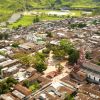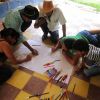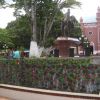Platforms & Passageways
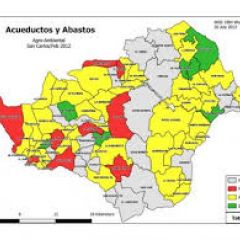
2013 to 2014
Undergraduate Research
Humanities Lab
The research project Platforms and Passageways explores the informational walls that inhibit resettlement and reconstruction in the aftermath of war and disaster. It draws on research in post-conflict zones in Colombia to develop methods and tools for gathering, displaying, and sharing the information needed to support long-term reconstruction planning.
More than five million Colombians are still internally displaced after three decades of conflict, but a steady decrease of fighting in the municipality of San Carlos in Eastern Antioquia—the project’s focal area—has resulted in large-scale voluntary return. The situation has created unprecedented alliances of municipal, departmental, and national government agencies, non-governmental organizations, and private sector. As these groups undertake the enormous project of return and reconstruction, the coordination of information is a persistent problem.
The class project builds upon a collaborative security initiative that produced a set of color-coded maps showing the security status of 76 San Carlos villages. The maps presented important information in a way that all involved parties could understand. This security-assessment methodology was then adapted for use in village development plans, through an effort that brought course co-instructor Erin Parish and undergraduates in Duke’s BorderWork(s) Lab into collaboration with the municipal government of San Carlos and the International Organization of Migration. Their work drew on knowledge assembled by the municipal government after two years of creating participatory budgets at the village and neighborhood level.
Platforms and Passageways builds upon these earlier efforts. Using a variety of cartographic techniques, students in the project are helping to develop methods and data visualization tools to illustrate the status of a wide range of community resources, such as education, infrastructure, community organization, and the environment.
Research for this project takes place not only in the lab but in the field, in Colombia, where students consult with municipal officials and community members to test and refine their work. The hope is to develop tools that can be scaled up for national or international policy making and scaled down for village level planning, monitoring, and evaluation.
People
|
Faculty Co-Chair of the Executive Committee of the DHRC@FHI |
Graduate Student, Cultural Anthropology |
Highlights
|
"Platforms and Passageways" Summer Research in Columbia
-- Feb 7 2014
This summer, two students involved in the “Platforms and Passageways” project travelled to Colombia to continue the research they began in class. Albert DeCaprio conducted interviews with... Read More |
Social Stoplighting: Participatory Methods for Post-Conflict Reconstruction
-- Mar 15 2015
Social Stoplighting is a participatory planning method that combines community assessment workshops with digital geo-referenced maps. The goal is to create tools that facilitate participatory... Read More |
Platforms and Passageways Maps Community Resources in Colombia
-- Mar 31 2014
The focus of the BorderWork(s) research project Platforms and Passageways is on how to coordinate the information that internally displaced Colombians need as they return to their home villages.... Read More |
Labs
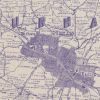 2011 to 2014 |



